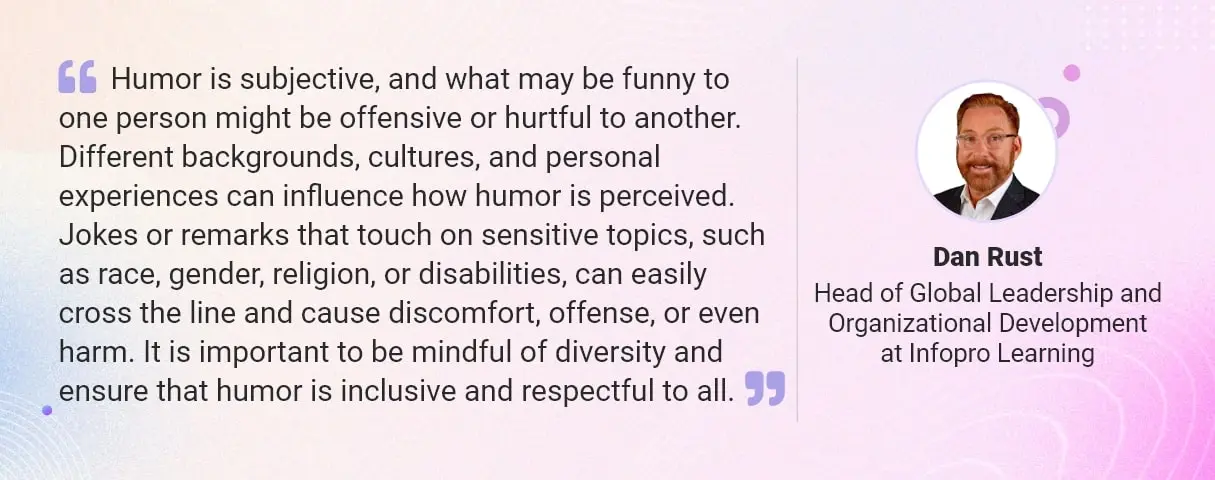Two executives walk into a bar. One says to the other “I’ve been thinking. If you took over as CEO, I could retire early.” The other executive responds, “Sure, dear, but not until after we put the kids to bed.”
(What? Oh, I get it … that’s like a joke, but not as funny.)
Laughter is often seen as a natural remedy that brings joy and lightness into our lives, including (maybe especially?) the workplace. A lighthearted and humorous environment can foster employee engagement, boost creativity, improve team dynamics, and enhance overall well-being.
But while humor can have numerous benefits in the workplace, it is essential to recognize that there can be a potential downside. Understanding these risks is crucial for maintaining a respectful and inclusive work environment while also fostering a spirit of light-hearted fun.

Inappropriate or insensitive humor can reinforce stereotypes, biases, or discriminatory attitudes. Jokes that perpetuate harmful stereotypes based on gender, ethnicity, or any other characteristic can create a hostile work environment and damage relationships among team members. Humor should never be used as a means to belittle or marginalize individuals or groups.
If humor becomes exclusive or clique-based, it can alienate certain individuals or groups within the workplace. Inside jokes or humor that relies on shared experiences, interests, or cultural references may unintentionally exclude those who do not share the same background or knowledge. Such exclusion can lead to feelings of isolation, reduced team cohesion, and hinder effective collaboration.
Humor can be inappropriate if used in inappropriate contexts or at inappropriate times. For example, making jokes during serious or sensitive discussions, in the presence of clients or customers, or in situations that require professionalism and focus can undermine the seriousness of the matter and create discomfort or tension. It is important to exercise judgment and consider the appropriateness of humor based on the situation.
Excessive or constant humor can hinder productivity and focus in the workplace. While a lighthearted atmosphere can boost morale, too much emphasis on humor can lead to distractions and a lack of focus on work-related tasks. It is essential to strike a balance between creating an enjoyable work environment and maintaining productivity and professionalism.
Humor, if not carefully managed, can lead to miscommunication or misunderstandings. Jokes that rely heavily on sarcasm, irony, or subtlety may not always be understood by everyone, potentially causing confusion or unintentionally conveying unintended messages. Clear and effective communication should always be the priority, and humor should be used in a way that does not compromise understanding or convey mixed signals.
So this all sounds pretty serious. One could be forgiven for deciding to just avoid anything that strikes others as funny. But unfortunately this leads to a flat humorless work environment. Which is a shame because the workplace can be a source of stress, with deadlines, pressures, and challenges. Introducing humor into the work environment can help alleviate tension, providing much-needed relief. Laughter triggers the release of endorphins, reducing stress hormones and promoting a sense of well-being. A lighthearted atmosphere helps employees develop resilience, cope with setbacks, and maintain a positive outlook.
So how does one strike the balance between humor and sensitivity in order to foster a positive and inclusive workplace culture? Start with self-depreciation. Poking fun at yourself in a sincere light-hearted manner puts others at ease. Promote humor that is inclusive, uplifting, and respectful to all individuals. Encourage jokes or humorous interactions that bring people together rather than alienating or marginalizing certain groups. Ensure that humor does not reinforce stereotypes, biases, or discriminatory attitudes.
Do you have a natural gift for light-hearted humor at work? (Hint: If you’re wondering, the answer is probably a “no.”)
Humor stimulates creativity and innovation by encouraging a playful and open mindset. When people feel comfortable expressing their ideas and taking risks, they are more likely to think outside the box and come up with innovative solutions. Humor can break down mental barriers, spark new perspectives, and foster a culture of creativity within teams and organizations.
Shared laughter and humor strengthen social bonds and foster a sense of camaraderie among team members. When humor is encouraged, it creates an inclusive and supportive work environment, where individuals feel connected and valued. Humor helps break down barriers, reduces hierarchies, and promotes effective communication and collaboration.
A workplace that embraces humor experiences higher levels of employee engagement. When employees enjoy their work environment, they are more motivated, committed, and willing to go the extra mile. Humor can improve job satisfaction, create a positive company culture, and enhance overall employee well-being. It fosters a sense of belonging and loyalty, resulting in increased productivity and reduced turnover.
So go ahead, use humor to break down communication barriers and facilitate more effective interactions. When used appropriately, humor can convey messages more effectively, making information memorable and engaging. It creates a conducive environment for learning, as individuals are more likely to absorb information when it is presented in an enjoyable and entertaining manner.
Humor is a powerful tool that can transform the workplace into an environment of engagement, creativity, and well-being. By embracing humor, organizations can foster resilience, improve team dynamics, boost creativity, enhance employee engagement, and create a positive work environment. Encouraging laughter and lightheartedness not only increases job satisfaction and productivity but also promotes a sense of joy and fulfillment in the workplace. So, let’s embrace humor and harness its transformative power to create happier, more connected, and thriving workplaces.
So have fun. But be careful. Go for it. But be sensitive. Laugh. Just not too loud. (That’s funny, right?)





Wow! This is so rich especially since you took your time to look at humor from both sides. I know today that if humor is not used appropriately it could cause more harm than good to the team and the organization at large. Thanks, Dan Rust.